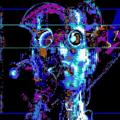Marek apžvelgė autoriaus Peter Watts knygą Echopraxia (Firefall, #2)
Second guessing first contact
4 žvaigždutės
The follow up to his 2006 "Blindsight", "Echopraxia" is yet quite a separate narrative from its predecessor. There is some connecting tissue, but this is quite a different tale, and you'd miss very little if you read it by itself.
The story is set in a triple aftermath. First contact has left humanity with species-wide existential angst; a separate set of crises have left the world (already reeling from climate apocalypse), struggling with a very science-fictiony, rather than horror, undead problem (two of them, actually); and more locally, a violent confrontation leaves the protagonist and a group of strange maybe-trans-human allies in a race across the solar system.
While "Blindsight" went outward, this book heads mostly inward, toward the sun, and a station upon which the world relies for its energy. And something's not quite right...
As with the first book, the tale here is one of …
The follow up to his 2006 "Blindsight", "Echopraxia" is yet quite a separate narrative from its predecessor. There is some connecting tissue, but this is quite a different tale, and you'd miss very little if you read it by itself.
The story is set in a triple aftermath. First contact has left humanity with species-wide existential angst; a separate set of crises have left the world (already reeling from climate apocalypse), struggling with a very science-fictiony, rather than horror, undead problem (two of them, actually); and more locally, a violent confrontation leaves the protagonist and a group of strange maybe-trans-human allies in a race across the solar system.
While "Blindsight" went outward, this book heads mostly inward, toward the sun, and a station upon which the world relies for its energy. And something's not quite right...
As with the first book, the tale here is one of disorientation. The protagonist is not able to understand or keep up with any of the other characters. While this provides the basis for exposition as he figures things out (slowly), it is mostly frustrating for us as there can be no sense of agency, just hopeless thrashing and occasionally being baled out by the much more capable and informed non-POV characters. The ideas are interesting, and often compelling, but the action is often painful, given the impossibility of agency.
It is worth it, for the ideas.


